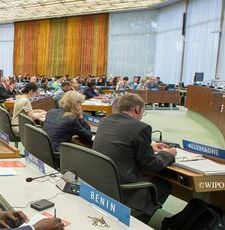ABOUT THE RESOURCE
The EIFL Draft Law on Copyright is a practical guide to assist librarians, policy-makers and legislators when copyright laws are being updated. It contains provisions that support access to knowledge and the public interest mission of libraries, and it reflects legislative developments, current thinking on copyright policy, and new technologies.
The Draft Law contains a coherent set of definitions and it pays special attention to limitations and exceptions to copyright for libraries and their users. It applies fully to the digital environment, has important provisions for digital preservation, inter-library document supply, persons with disabilities, orphan works, translations, text and data mining and secondary publication rights (SPR). It also includes a flexible exception, increasingly recognized by policy makers as the means to 'future proof' the law for technological developments, and the exceptions in the draft law are protected from override by contract terms. Each exception included in the Draft Law, and the SPR provision, is accompanied by a short explanatory note that describes the policy goal and examples of its practical effect.
The EIFL Draft Law on Copyright is compatible with international treaties and directives, including the Marrakesh Treaty for persons with print disabilities (2013), and the European Directive on Copyright in the Digital Single Market (2019), and it inspired provisions in progressive national laws, such as the Copyright Act, 2022 of Nigeria.
Since the first edition of the EIFL Draft Law on Copyright was published in 2009, it has undergone three revisions.
In 2014, the text was updated for the Marrakesh Treaty for persons with print disabilities, adopted in 2013 by member states of the World Intellectual Property Organization (WIPO). In addition, new five provisions were added - text and data mining, a general, flexible exception, a limitation on the liability of librarians and archivists in certain circumstances, the purchase and lending of materials, and access to withdrawn works. Provisions for inter-library document supply and public documents were also amended.
In 2016, we simplified the exception for persons with disabilities to facilitate its easy implementation into national law - following entry into force in 2020 of the Marrakesh Treaty, many countries were amending their laws to enable the creation and cross-border transfer of accessible format copies. EIFL’s exception also includes persons with other disabilities, such as deaf people.
In 2025, we added a new provision on Secondary Publication Rights (SPR) . To boost the achievement of open access to research, a growing number of countries in Europe have introduced SPR in a range of laws, for example, copyright, science, technology & innovation, economics and culture. To guide librarians and legislators in EIFL partner countries, we decided to add a new article on SPR - Article 8 - in EIFL’s Draft Law on Copyright. We also refreshed and re-designed the document.

SHARE / PRINT









